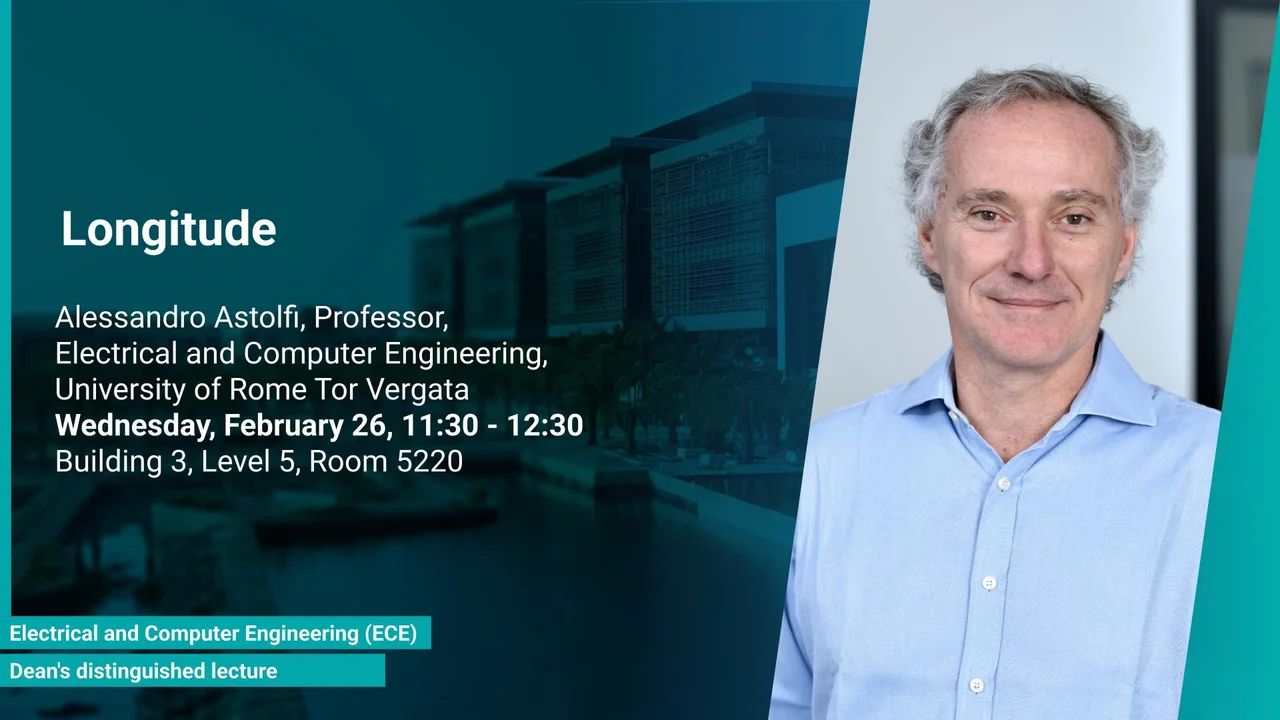
This lecture discusses the longitude problem, its solution, and illustrates key concepts (coordinates, geometry, interconnection, energy) applicable to nonlinear systems, model reduction, optimal filtering, and future research in control, dynamic sets, and multimedia.
Overview
The Longitude problem, and its solution by Harrison, are briefly discussed to highlight the role of coordinates, geometry, interconnection and energy in the solution of complex problems. These are in turn used to define moments and phasors for nonlinear systems and circuits; to discuss the role of interconnection in model reduction and network systems; and to provide a solution to the optimal nonlinear filtering problem. Future perspectives and directions in the areas of constrained optimal control, modelling and control of dynamics sets, and multimedia are also discussed.
Presenters
Alessandro Astolfi, Professor, Department of Civil Engineering and Computer Engineering, Tor Vergata University of Rome, Italy
Brief Biography
Alessandro Astolfi (IFAC Fellow, FIEEE) received the Laurea in Electronic Engineering from the University of Rome La Sapienza, Italy, in 1991; the M.Sc. degree in Information Theory and the Ph.D. degree with Medal of Honor with a thesis on discontinuous stabilization of holonomic systems from ETH-Zurich, Zurich, Switzerland, in 1995; and the Ph.D. degree for his work on nonlinear robust control from the University of Rome “La Sapienza,” Rome, in 1996. In 1992, he joined ETH-Zurich as a research associate. Since 1996, he has been with the Electrical and Electronic Engineering Department, Imperial College London, London, U.K., where he is currently Professor of Nonlinear Control Theory and College Consul for the Faculty of Engineering and Business School. From 2010 to 2022, he was the Head of the Control and Power Group at Imperial College London, and from 1998 to 2003, he was an Associate Professor with the Department of Electronics and Information, Politecnico of Milano, Milano, Italy. Since 2005, he has also been a Professor with the Dipartimento di Ingegneria Civile e Ingegneria Informatica, University of Rome Tor Vergata, Rome. His research interests include mathematical control theory and control applications, with special emphasis for the problems of discontinuous stabilization, robust and adaptive control, observer design, optimal control, game theory, and model reduction. Dr. Astolfi was the recipient of the IEEE CSS A. Ruberti Young Researcher Prize (2007); the IEEE RAS Googol Best New Application Paper Award (2009); the IEEE CSS George S. Axelby Outstanding Paper Award (2012); the Automatica Best Paper Award (2017); and the IEEE Transactions on Control Systems Technology Outstanding Paper Award (2023). He is a “Distinguished Member” of the IEEE CSS, IFAC Fellow, IET Fellow, and Member of the Academia Europaea. He is the recipient of the Institute of Measurement and Control Sir Harold Hartley Medal for “Outstanding contributions to the technology of measurement and control”. He was the Associate Editor, Senior Editor, Area Editor for several journals, and Editor-in-Chief for the European Journal of Control. He is Editor-in-Chief of the IEEE Transactions on Automatic Control (2018 --). He was Chair of the IEEE CSS Conference Editorial Board (2010–2017); Chair of the IEEE CSS Antonio Ruberti Young Researcher Prize (2015–2021); and Member of the IEEE Fellow Committee in 2016 and from 2019 to 2022. He is Vice Chair of the IFAC Technical Board (2020–2026); a Member of the IEEE PSPB Strategic Planning Committee; and a Member of the IEEE Thesaurus Editorial Board.